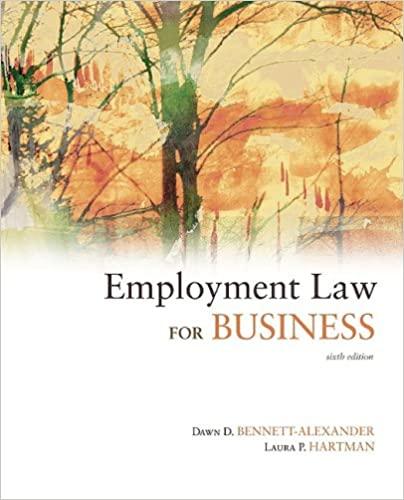Think about the following questions from the point of view of violation of public policy or breach
Question:
a. An employee was suspended pending discharge for sleeping and “loafing” on the job. The employer offered to change the penalty to suspension without pay if the plaintiff would sign a “last-chance agreement” under which he waived and released “any claims, suits, or causes of action” against the defendant. The employee refused to sign because he was unwilling to waive his rights to state unemployment benefits or workers’ compensation. Under state statute, agreements to waive such rights are invalid. The employee is discharged. [Edelberg v. Leco Corp., 236 Mich. App. 177 (1999).]
b. A nurse is asked by her employer to sign a backdated Medicare form. She refuses and is terminated that day. As a healthcare provider, she is required to complete that particular form. [Callantine v. Staff Builders, Inc., 271 F.3d 1124 (8th Cir. 2001).]
c. A legal secretary to a county commissioner is terminated because of her political beliefs. [Armour v. County of Beaver, 271 F.3d 417 (3d Cir. 2001).]
e. Employee is terminated because she married a co-worker. [McCluskey v. Clark Oil & Refining Corp., 498 N.E.2d 559 (Ill. App. Ct. 1986).]
f. Employee discovers that his supervisor is involved in a wrongdoing. The supervisor terminates the employee to prevent the employee from disclosing her wrongdoing to higher-level management. [Adler v. American Standard Corp., 830 F.2d 1303 (4th Cir. 1987).]
g. A legal secretary is hired by a law firm. The Letter of Employment stated, “In the event of any dispute or claim between you and the firm . . . including, but not limited to claims arising from or related to your employment or the termination of your employment, we jointly agree to submit all such disputes or claims to confidential binding arbitration, under the Federal Arbitration Act.” On his third day of work, the employee informs his superiors that he would not agree to arbitrate disputes. He was told that the arbitration provision was “not negotiable” and that his continued employment was contingent upon signing the agreement. The employee declined to sign the agreement and was discharged [Lagatree v. Luce, Forward, Hamilton & Scripps, 74 Cal. App. 4th 1005 (Cal. App. 2d Div. 1 1999).]
h. Employee is licensed to perform certain medical procedures, but he is terminated for refusing to perform a procedure he is not licensed to perform. [O’Sullivan v. Mallon, 390 A.2d 149 (N.J. Super. Ct. Law Div. 1978).]
i. An employee was fired from his job as security manager for a medical center because he was suspected of making an obscene phone call to another employee and refused to submit to voice print analysis to confirm or refute the accusation. He sued the employer for wrongful discharge, claiming that the employer’s request violated public policy. A state statute prohibits an employer from requiring an employee to submit to a polygraph examination as a condition or precondition of employment. [Theisen v. Covenant Medical Center, 636 N.W.2d 74 (Iowa 2001).]
Fantastic news! We've Found the answer you've been seeking!
Step by Step Answer:
Related Book For 

Employment Law For Business
ISBN: 978-0077347383
6th Edition
Authors: Dawn Bennett Alexander, Laura P Hartman
Question Posted:





